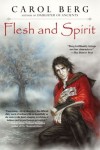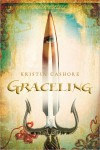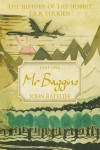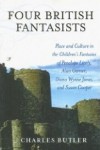Mythopoeic Awards
Acceptance Remarks — 2009
2009 Mythopoeic Fantasy Award for Adult Literature
Carol Berg, Flesh and Spirit and Breath and Bone Web site: textcrumbs.blogspot.com
Web site: textcrumbs.blogspot.comI stand in the company of giants. How can I possibly say more than that?
Well, I purport to be a writer of epics, thus I always have extra words. As I am accustomed to spending a great deal of my time in a world that is not present reality, I'm not sure I quite believe I am to join such august company. Perhaps some of you could pinch yourselves and email me if you actually heard my name called.
I am terribly sorry I can’t be in Los Angeles tonight to take all this in and to thank every single person who opened this world of marvels to me. The nun who put Edith Hamilton on the sophomore reading list every year. The college roommate who shoved her battered copy of Lord of the Rings into my hands in 1968. And that dear friend who persuaded a software engineer whose kids were needing less of her time that writing some email letters in character might be fun, “as it wasn't like writing a novel or anything.”
 In short, I am deeply honored that you’ve found something of truth in my story and seen fit to let my dear
Valen hobnob with Merlin and True Thomas, Kim and Paul, Aragorn, Corwin of Amber, and all the rest.
In short, I am deeply honored that you’ve found something of truth in my story and seen fit to let my dear
Valen hobnob with Merlin and True Thomas, Kim and Paul, Aragorn, Corwin of Amber, and all the rest.2009 Mythopoeic Fantasy Award for Children’s Literature
Kristin Cashore, Graceling Web site: kristincashore.blogspot.com
Web site: kristincashore.blogspot.comI received the news that Graceling had been awarded the Mythopoeic Fantasy Award for Children’s Literature while I was in the middle of a long-distance move from Florida to Massachusetts. What could be more perfect timing? Not only did it lighten my mood, but now I know to arrange my new apartment so that my marvelous Aslan statue is the centerpiece!
Let me explain to you the gift that the Mythopoeic Society has given me. I wrote Graceling several years ago, and once the final edits of Katsa’s story were done, they were done. I moved on the next book, and the next, and never looked back.
Now I’m writing a book called Bitterblue, and it consumes my mind and heart. It’s writing very slowly. Sometimes I think it’s about something — I think it’s a real, genuine book — but more often, it feels like no more than a murky mess. I am convinced, most of the time, that I will never, ever make it what I want it to be.
And then, suddenly, the Mythopoeic Society descends from above and says to me, “Here! We have chosen your book, Graceling, for this amazing honor. We think the fantasy world you created is pretty snazzy. Plus, we have the coolest statue of any award-giving society in America. Congratulations! You deserve it.”
And, well, I could not be more stunned. A Mythopoeic Award for Graceling? Really? Finally, I find myself looking back. And I remember that when I was writing Graceling, sometimes I thought it was about something — I thought it was a real, genuine book — but more often, it felt like a murky mess. I was convinced, most of the time, that I would never, ever make it what I wanted it to be.
With this award, you have given me three gifts: memory, hope, and determination. You are telling me that in the end, I did make it work with Graceling, and that makes me feel like maybe — just maybe — I can turn Bitterblue, too, into something more than an insufferable mess. You haven’t just given me an honor for something I did in the past; you have given me mettle for the future. How can I ever thank you enough for that magic?
I will keep my Aslan statue nearby as I write, to remind me.
 I’m so sorry I can't be there to accept this great honor in person. If I hadn’t just moved, I would be.
I promise you that tonight, I am sitting in a fort of boxes and drinking a toast to the Mythopoeic Society.
I’m so sorry I can't be there to accept this great honor in person. If I hadn’t just moved, I would be.
I promise you that tonight, I am sitting in a fort of boxes and drinking a toast to the Mythopoeic Society.
2009 Mythopoeic Scholarship Award for Inklings Studies
John Rateliff, The History of the Hobbit, Part One: Mr. Baggins; Part Two: Return to Bag-end Web site: www.sacnothscriptorium.com/
Web site: www.sacnothscriptorium.com/“Thag you very buch.”
If I were as laconic as Mr. Baggins himself at the celebrations in Lake Town, I'd just stop there and be done with it. But, as the nine-hundred-plus pages of my History of the Hobbit suggest, such is not the case.
And so, on this festive occasion, I would like to thank the Society, and the Awards Committee, and Mythcon itself for this very great honor. I wish I could be among you to accept this award in person. Having first joined the Society more than thirty years ago — in the same year in which Roger Lancelyn Green and Walter Hooper shared the award for their then-new biography of C.S. Lewis — I honestly never imagined then that a decade later I would attend my first Mythcon. Or that two years after that I would help run another, or that I would present chapters from this book at two other Mythcons, much less one day receive this award.
I had originally thought of taking this opportunity to thank all the people who helped me on my book. But on second thought this might, like Bilbo’s ‘eleventy-first’ party speech, drag on a bit for those esteemed Mythconners at this banquet, especially since it would be in the form of a person, who isn’t here, thanking other people, who are also not here.
I do want to seize this opportunity, though, to thank one person whose acknowledgement inadvertently got left out from the original (UK) printing of my book. David Bratman’s name should have appeared among those people before whom I presented earlier drafts of various chapters from this eternal work-in-progress from time to time, since I benefitted greatly from his encyclopedic knowledge and attention to detail. Even though this was fortunately fixed in time for the American edition, I still wanted to thank him here and now.
As for my book itself, what can I say that I have not already said, at length, within its pages? I took as my inspiration C.S. Lewis’s words to J.R.R. Tolkien, back around the spring of 1936, that there were too few of the sort of books they liked to read in the world and that they needed to write some themselves. This is essentially what I have done: written the book I’d like to discover on a bookstore’s or library’s shelf. For a time I feared that I was the only one who would want to read it. This award has quelled those fears.
After he plowed through The History of The Hobbit, Charles Noad wrote “surely nothing remains to be said.” Happily he was wrong. Trying to get to the bottom of a Tolkien story is like staring into an ent’s eyes: deep wells very much in the present but filled with the memory of ages.
 But who wouldn’t drink deep of that well, given the chance? So: the work goes on. And so my thanks for this encouragement,
and this honor. Thank you very much.
But who wouldn’t drink deep of that well, given the chance? So: the work goes on. And so my thanks for this encouragement,
and this honor. Thank you very much.2009 Mythopoeic Award for Myth and Fantasy Studies
Charles Butler, Four British Fantasists
First, let me say that I am thrilled and delighted to have won this award, and very grateful to the committee for having chosen my book, especially given the excellent company it was keeping on the shortlist. I'm sorry I’m unable to be with you tonight, but instead I’m speaking to you through the good offices of Farah Mendlesohn, my friend, writing buddy, and generous rival.
Four British Fantasists was long in the making. I suppose it began in my childhood, when the stories of Alan Garner and Susan Cooper in particular were potent in opening up to me the curious enchantment of the island of Britain. By the 1980s, when I was looking around for a PhD subject, I had already formulated a plan to write something on the role of mythology and folklore in the work of various admired children’s writers. To my dismay, I was taken aside by a lecturer and advised to read the dissertation recently completed on exactly that subject by Neil Philip. I did so, and was sufficiently impressed, not to say intimidated, by Philip’s scholarship to shelve the whole idea and spend the next four years studying The Faerie Queene instead.
That was a disappointment at the time, but at the risk of sounding like the improbable lovechild of Pollyanna and Dr Pangloss I believe it turned out to be a good thing, not only because time spent in the company of Edmund Spenser is never time wasted, but because it gave my subconscious a few more years to work the theme of British fantasy writing. Also, I was being introduced to new authors — new to me — such as Diana Wynne Jones, and the old authors were continuing to produce new work. By the time I came to write the book at last my four British fantasists had written (depending how you count it) some eighty novels between them. My own writing was a labour, but most definitely one of love. I made many new friends through it, and was aided in innumerable ways by the ideas and arguments I met along the way. The recognition it has received here is especially gratifying, coming from the community to whom I would most like to feel that I have spoken — that of readers and scholars steeped in the same tradition of fantasy as these four authors, and myself.
 Thank you once again. An empty throne awaits in Cair Paravel: the mantelpiece has actually been dusted: Aslan is on the move!
Thank you once again. An empty throne awaits in Cair Paravel: the mantelpiece has actually been dusted: Aslan is on the move!